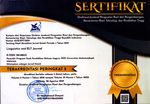Enhancing EFL Reading Proficiency through Authentic Assessment: A Case Study on Student Engagement and Learning Behavior
Abstract
Authentic assessment includes alternative assessments that engage students through authentic tasks with authentic materials. It includes performance assessment, portfolio, self-assessment, etc. These types of assessment may help teacher to monitor students’ learning progress and attitudes. In response to that, the present study aimed to discover students’ responses regarding the application of authentic assessment to help them read longer English texts. To achieve the purpose of the study, a case study was employed. Data were gathered from 16 week-observation, students’ work, and forms of students’ self-assessment. The results of the study revealed that despite a shift on the students’ motivation and learning behavior, a positive trend was indicated. At the beginning, students tended to show anxiety and hesitance when expressing their interpretation of reading text during in-class discussions. Throughout the time, they gradually invested more efforts, specifically in demonstrating their thoughts of reading materials. Additionally, the number of students actively delivering opinions were increasing.
Keywords
Full Text:
PDFReferences
S. Schamroth and H. R. Gerber, “Feedback Loop : Videogames , Authentic Ο again and then you solve it .,” English J., vol. 103, no. 1, pp. 95–103, 2013.
A. Warrington, L. Graeber, H. White, and J. Saxton, “Finding Value in the Process: Student Empowerment through Self-Assessment,” English J., vol. 107, no. 3, pp. 32–38, 2018, doi: 10.58680/ej201829464.
K. F. Clark and M. F. Graves, “Scaffolding Students’ Comprehension of Text,” Read. Teach., vol. 58, no. 6, pp. 570–580, 2005, doi: 10.1598/rt.58.6.6.
S. Filkins, “ηπ,” vol. 103, no. 1, pp. 48–53, 2013.
F. Zachoval, “Individualized Project-Based Reading and its Effect on Students ’ Reading Habits and Beliefs Author ( s ): Filip Zachoval Source : Russian Language Journal / Русский язык , 2013 , Vol . 63 ( 2013 ), pp . 113-133 Published by : American Councils for Intern,” vol. 63, pp. 113–133, 2013.
Q. V. Hoang, “The Effects of Authentic Materials on EFL Students’ Attitudes and Confidence in Speaking Skills,” TESOL Work. Pap. Ser., no. May 2024, pp. 19–33, 2022, [Online]. Available: http://www.hpu.edu
F. R. Abdulhussein, “ScienceDirect Investigating EFL College Teachers ’ and Learners ’ Attitudes toward Using Authentic Reading Materials in Misan,” vol. 136, pp. 330–343, 2014, doi: 10.1016/j.sbspro.2014.05.338.
E. Namaziandost, M. H. Razmi, S. Ahmad Tilwani, and A. Pourhosein Gilakjani, “The Impact of Authentic Materials on Reading Comprehension, Motivation, and Anxiety Among Iranian Male EFL Learners,” Read. Writ. Q., vol. 38, no. 1, pp. 1–18, 2022, doi: 10.1080/10573569.2021.1892001.
E. Namaziandost, M. H. Razmi, and S. A. Tilwani, “The Impact of Authentic Materials on Reading Comprehension , Motivation , and Anxiety Among Iranian Male EFL Learners The Impact of Authentic Materials on Reading Comprehension ,” Read. Writ. Q., vol. 38, no. 1, pp. 1–18, 2022, doi: 10.1080/10573569.2021.1892001.
A. M. Bhooth, H. Azman, and K. Ismail, “Investigating the reading practices of EFL yemeni students using the learning by design framework,” TESOL J., vol. 6, no. 3, pp. 418–446, Sep. 2015, doi: 10.1002/tesj.148.
G. H. Beckett and T. Slater, Global Perspectives on Project-Based Language Learning, Teaching, and Assessment. 2019. doi: 10.4324/9780429435096.
C. Davison, N. South, and C. London, “Current Issues in English Language,” vol. 43, no. 3, pp. 393–415, 2009.
M. Bernaus and R. C. Gardner, “Teacher motivation strategies, student perceptions, student motivation, and English achievement,” Mod. Lang. J., vol. 92, no. 3, pp. 387–401, 2008, doi: 10.1111/j.1540-4781.2008.00753.x.
A. Feryok and J. Oranje, “Adopting a Cultural Portfolio Project in Teaching German as a Foreign Language: Language Teacher Cognition as a Dynamic System,” Mod. Lang. J., vol. 99, no. 3, pp. 546–564, 2015, doi: 10.1111/modl.12243.
S. E. Technology, N. April, and N. Di Blas, “International Forum of Educational Technology & Society Authentic Learning , Creativity and Collaborative Digital Storytelling Author ( s ): Nicoletta Di Blas Published by : International Forum of Educational Technology & Society Stable URL : https://www.,” vol. 25, no. 2, pp. 80–104, 2022.
Z. Azizi, E. Namaziandost, and A. Rezai, “Heliyon Potential of podcasting and blogging in cultivating Iranian advanced EFL learners ’ reading comprehension,” vol. 8, no. January, 2022.
O. Languages and T. Quarterly, “A Meta-Analysis of Extensive Reading,” vol. 49, no. 1, pp. 6–37, 2019.
X. Yu and C. Liu, “Reading aloud in ELT in China : an interview-based investigation and its implications,” 2021, doi: 10.1080/09571736.2018.1496352.
B. Bai and J. Wang, “Conceptualizing self-regulated reading-to-write in ESL/EFL writing and investigating its relationships to motivation and writing competence,” Lang. Teach. Res., vol. 27, no. 5, pp. 1193–1216, 2023, doi: 10.1177/1362168820971740.
DOI: https://doi.org/10.31764/leltj.v12i1.24178
Refbacks
- There are currently no refbacks.
Copyright (c) 2024 Triubaida Maya Ardianti

This work is licensed under a Creative Commons Attribution-ShareAlike 4.0 International License.
_____________________________________________________
Linguistics and ELT Journal
p-ISSN 2339-2940 | e-ISSN 2614-8633

LELTJ is licensed under a Creative Commons Attribution-ShareAlike 4.0 International License.
_____________________________________________________
LELTJ is abstracting & indexing in the following databases:
_____________________________________________________
LELTJ Editorial Office:













